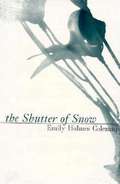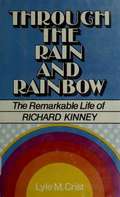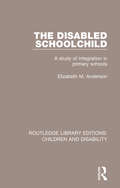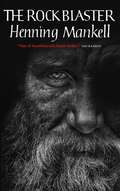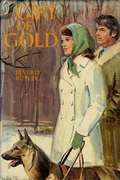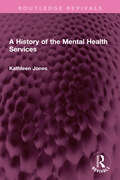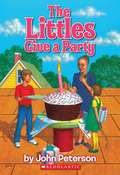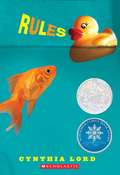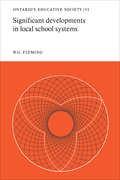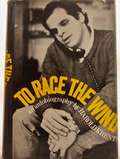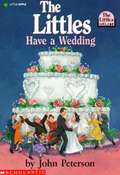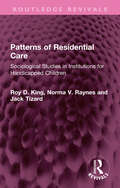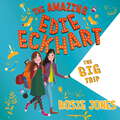- Table View
- List View
The Shutter of Snow
by Emily Holmes ColemanFirst published in 1930, this short novel is based on the author's experience in Rochester State Hospital when she became psychotic after the birth of her son. The stream-of-consciousness style conveys the protagonist's disturbed, and stunningly original, thought processes. Coleman was active in the expatriate literary scene in Paris during the 1920's, was secretary to Emma Goldman, and knew such figures as Djuna Barnes and Gertrude Stein.
Through the Rain and Rainbow: The Remarkable Life of Richard Kinney
by Lyle M. Crist<P>Richard Kenny lost his sight at age seven. He spent his childhood adjusting to and overcoming blindness. He entered college but had to drop out in his second year when his hearing failed. <P>The next ten years contained motes of both great anguish and sweet victory as he adjusted to being totally deaf-blind. With perseverance, the support of family and friends, and the counsel of such leaders as Helen Keller and other workers for the deaf and blind, Kenny became the third deaf-blind person in history to earn a college degree. He married, became a father, traveled and wrote.
Toward Independence: The Use of Instructional Objective in Teaching Daily Living Skills to the Blind
by Anne YeadonThis book is an introduction to the use of instructional objectives in the teaching of severely visually impaired persons. While it happens to use a daily living skills course as an example of how a teacher might develop a course around this educational method, it is not a daily living skills teaching manual. A creative teacher should be able to adapt the approach as described in Toward Independence to many other subjects.
The Disabled Schoolchild: A Study of Integration in Primary Schools (Routledge Library Editions: Children and Disability #2)
by Anderson Elizabeth M.First published in 1973, this book considers the differences between mainstream schools and special educational needs schools, for children with learning disabilities. It contains a wealth of research data, case history material and reference to existing literature, designed to answer many questions which parents, heads, and schoolteachers have asked. Questions considered include whether children with disabilities do as well in ordinary schools as children without, whether they are as happy and well adjusted, and how they fit into the social structure of the class. The book also looks at whether much teasing occurs and how practical difficulties can be overcome.
Eyes at My Feet
by Jessie HickfordFrom the Book Jacket: In my work as a veterinary surgeon I regularly examine and treat guide dogs and I always find something humbling in the cheerfulness of the blind people and their pride in the wonderful animals which serve as their eyes. But not until now have I had the opportunity to read how one of these partnerships developed. With no trace of self pity Jessie Hickford takes us with her through the early difficult days of her training with her dog Prudence; and surely no writer has more movingly described the flowering of companionship and love between animal and mistress as they gradually adjust to each other. I like to write about animals and I enjoy reading about them too, so this is a book for me and for all the thousands who share my tastes. 'It is not a sad book, it is a happy one because it is a story of ultimate triumph ; and I do not know which character captivated me most the brave woman who wrote it or the beautiful dog she has never seen. JAMES HERRIOT Author of ALL CREATURES GREAT AND SMALL
The Rock Blaster
by Henning MankellAn early gem from the creator of the Kurt Wallander series, charting the life of a principled man through tragedy, heartbreak, true love and the battle for a nation's soul."A very engaging portrait . . . There is a powerful lack of sentimentality to the telling of the story [and] a lovely and genuinely moving love story at the heart of the book." Liam Heylin, Irish ExaminerAt 3 p.m. on a Saturday afternoon in 1911, Oskar Johansson is caught in a blast in an industrial accident. The local newspaper reports him dead, but they are mistaken.Because Oskar Johansson is a born survivor.Though crippled, Oskar finds the strength to go on living and working. The Rock Blaster charts his long professional life - his hopes and dreams, sorrows and joys. His relationship with the woman whose love saved him, with the labour movement that gave him a cause to believe in, and with his children, who do not share his ideals.Henning Mankell's first published novel is steeped in the burning desire for social justice that informed his bestselling crime novels. Remarkably assured for a debut, it is written with scalpel-like precision, at once poetic and insightful in its depiction of a true working-class hero.Translated from the Swedish by George Goulding
Dogs Working for People
by Joanna FosterThis detailed book talks about the different ways dogs help or work for people. From hunting dogs, to Seeing Eye dogs, to dogs that sniff out bombs. With picture descriptions.
From Anna
by Jean LittleAnna has always been the clumsy one in the family. Somehow she can never do anything right! She bumps into tables, and she can't read the blackboard at her school. Her perfect brothers and sisters call her "Awkward Anna." When Papa announces that the family is moving from Germany to Canada, Anna's heart sinks. How can she learn English when she can't even read German? Nothing could be worse than this! But when the Soldens arrive in Canada, Anna learns that there is a reason for her clumsiness. And suddenly, wonderfully, her whole world begins to change.
Gift of Gold
by Beverly Butler<P>When Cathy Wheeler decided to become a speech therapist, she faced more than ordinary problems. Cathy was blind, and her speech department chairman said she had chosen an unrealistic profession. Even with sight, controlling young patients would be difficult, and to depend on other senses to work successfully with children would take extraordinary talent and alertness. <P>But Cathy had courage--backed up by a golden dream. An eye doctor had said that part of her sight might be restored. Not only would resistance to her chosen career stop, but Cathy knew she would find it easier to make up her mind about Greg and Steve, the two very different men in her life. <P>But suppose the verdict at the final eye examination went against her? Cathy wondered if she would have the courage then to stand on her own two feet and prove that she could handle a career in speech therapy. How would it affect her feelings about Greg and Steve? How would they feel about her?
A History of the Mental Health Services: A Revised History Of The Mental Health Services - From The Early 18th Century To The 1990s (Routledge Revivals)
by Kathleen JonesFirst published in 1972, A History of the Mental Health Services is a revised and abridged version of both Lunacy, Law and Conscience and Mental Health and Social Policy, rewriting the material from the end of the Second World War to the passing of the Mental Health Act 1959, and adding a new section which runs from 1959 to the Social Services Act 1970. The story starts with the first legislative mention of the ‘furiously and dangerously mad’ as a class for whom some treatment should be provided, traces the development of reform and experiment in the nineteenth century, and the creation of the asylum system, and ends in the age of Goffman and Laing and Szasz with the virtual disappearance of the system. The book will be of interest to students of mental health, sociology, social policy, health policy and law.
Independent Living Without Sight and Hearing
by Richard KinneyThis is a wonderful resource for blind-deaf individuals and those who interact with them. It covers such topics as communication methods, independence at home, telephones, travel hints and much more.
The Littles Give a Party
by John PetersonIt's a dangerous life, being smaller than six inches tall so it's truly amazing that Granny will be turning eighty on her Fourth of July birthday. Instead of being excited about it, she's worried that she's too old and has stopped paying attention to anything. Tom and Lucy, her great grandchildren and their family think a big party will cheer her up. The trouble is, most of Granny's favorite people think they are too old to travel to the party and riding in Cousin Dinky's glider is too risky. The Little's have a long list of adventures ahead to pull off the party. They must rig up a swimming pool, smuggle hot dogs, and hardest of all, they have to sneak young Henry's toy airplane out of his room at night to fly the guests to the party. Except for having to hear Dinky's terrible singing, it's all worth it because Granny is so excited to see her friends. Bookshare has many more books about the family who uses thimbles for wastebaskets and finger puppets on cereal boxes for costumes. Some of the Little's books are: The Littles, The Littles Take a Trip, The Littles and the Surprise Thanksgiving Guests, The Littles to the Rescue, Tom Little's Halloween Scare, The Littles and the Trash Tinies, The Littles Go to School, The Littles Get Trapped, and The Littles and the Missing Cat.
P.S. Your Not Listening
by Eleanor CraigNo school would take these children. Some were violent. Others were withdrawn. All were deeply disturbed. When Eleanor Craig took on the assignment to teach a class of special children who had been declared "unteachable" by others, she knew it wouldn't be easy. How do you teach long division to a child who believes that the banana in his lunchbox is alive and trying to escape? How do you maintain control when one of your students has locked you in the custodian's closet? How do you convince a child that people are not for hurting when he is constantly battered and rejected at home? During the year in which she taught a "transitional class" of acutely disturbed children, Eleanor Craig grappled with such problems each bewildering and exhausting day. P.S. Your Not Listening is the deeply-felt and often touching account of Mrs. Craig's attempts to reach her five exceptional pupils. Having no guidelines but her own empathy and resourcefulness, Mrs. Craig tries to reach the center of the children's chaotic world and to gain their trust. Gradually, she begins to establish human contact. Gradually, the children become more responsive. But the setbacks are many and the progress painfully slow. Eddie can only speak through aggression. Kevin's shoes tap out his anger. Violent fights flare up between Eddie and Douglas: Julie hides under her desk while Jonathan calls into his inkwell for help and Kevin urges Douglas to kill Eddie. Yet in the lulls between such destructive outbursts, Mrs. Craig perceives a real, if hesitant, sense of community emerging in the classroom. There are moments of celebration, as on the day that Jonathan, who believed he was a ghost and not a real boy, exclaims, "Doesn't it feel funny to wake up in the morning and say 'Who am I?' Doesn't it feel funny to wake up in the morning and be a human being?" P.S. Your Not Listening is ultimately not so much a book about education as a book about love.
Rules
by Cynthia LordThis 2007 Newbery Honor Book is a humorous and heartwarming debut about feeling different and finding acceptance. Now in After Words paperback! Twelve-year-old Catherine just wants a normal life. Which is near impossible when you have a brother with autism and a family that revolves around his disability. She's spent years trying to teach David the rules from "a peach is not a funny-looking apple" to "keep your pants on in public"---in order to head off David's embarrassing behaviors. But the summer Catherine meets Jason, a surprising, new sort-of friend, and Kristi, the next-door friend she's always wished for, it's her own shocking behavior that turns everything upside down and forces her to ask: What is normal?
Significant Developments in Local School Systems: Ontario's Educative Society, Volume VI
by W. G. FlemingThis volume deals with innovative developments of many different kinds in the local school systems in the years up to 1970. Information was obtained from a sampling of school boards, including the largest. The major purpose is to show what may be expected from an educational organization that gives local authorities a certain amount of leeway to depart from standard procedures. Innovations in teaching, curricular experimentation, changes in the structure and use of school buildings, and the growth of special services are fully covered.
To Race the Wind
by Harold KrentsThe autobiography of Harold Krents, a young blind man who was a well-known lawyer in the early 1970's. Harold was the inspiration for the film and play, Butterflies Are Free.
Twice Burned
by Bruce PorterfieldBruce Porterfield spent three terms in Bolivia with the New Tribes Mission. Much of his time there was spent with other missionaries in seeking to make a friendly contact with primitive tribes in remote areas of the country. The story of this work is told in his book, Commandos for Christ. In his second book, ["jungle Fire," which is also available in this library] Porterfield uses the novel as a means of revealing much truth about missionary work, the needs, problems and opportunities faced. In his latest book, Twice Burned, he again turns to the novel as a means of clarifying the issues between ecumenical and mass-meeting evangelism compared to the New Testament pattern of Gospel preaching and church planting.
What Katy Did (Katy #1)
by Susan CoolidgeTwelve-year-old Katy always planned to do a great many wonderful things but in the end did something she never planned at all. When life takes a turn, how will Katie respond? [please note: Misprints (and there are an excessive amount in this book, both spelling and punctuation) in original text preserved as dictated by copyright law.]
Art Not by Eye: The Previously Sighted Visually Impaired Adult in Fine Arts Programs
by Yasha LisencoThe book, in two parts, deal with avenues for adventitiously blind adult, and the blind and severely visually impaired adults in the art program.
The Littles Have a Wedding
by John PetersonMeet the Littles, a family like any other but with a few tiny differences! They live in the walls of the Bigg family house where they get everything they need. In return they make sure the Bigg house is always in good repair. When Dinky comes home from his latest adventure, he's not alone. Della came back with him and they're going to be married! But a tiny person wedding takes a huge amount of preparation. The Littles need to get everything ready and travel to a neighboring house by the next day. Will they be ready in time?
Patterns of Residential Care: Sociological Studies in Institutions for Handicapped Children (Routledge Revivals)
by Roy D. King Norma V. Raynes Jack TizardOriginally published in 1971, this title describes a series of studies dealing with the upbringing of children in residential institutions. Most work has been carried out in institutions for children with learning disabilities, although units caring for able but deprived children and children with physical disabilities have also been examined. The investigations have been concerned with the detailed nature of different institutional environments – that is, the routine patterns of daily life in hospital wards, hostels and cottages of children’s homes – rather than with the effects of specific child-rearing practices upon the intellectual, emotional and social development of the children. The more precise delineation of ‘the environment’ is an essential step towards the evaluation of residential services and the interpretation of their effects upon those who use them, yet this is an area which had received little systematic attention from social scientists at the time. This book is a re-issue originally published in 1971. The language used is a reflection of its era and no offence is meant by the Publishers to any reader by this re-publication.
The Big Trip: Book 2 (The Amazing Edie Eckhart #2)
by Rosie JonesFrom TV comedian Rosie comes a sparky and HILARIOUS series for listeners aged 9+. Perfect for fans of Jacqueline Wilson and DORK DIARIES.'Fresh, funny and ultra cool' - Jacqueline WilsonHello! My name is Edie Eckhart and I'm eleven years old. I'm a little bit different. I have a disability called cerebral palsy, so I talk slowly and fall over a lot. It's never really bothered me because I've never known anything else.Edie Eckhart is getting used to life at secondary school. It's going well so far - she's found a brand new friendship group and has the best form tutor EVER.But then the school organises a camping trip.... complete with muddy walks and team games. It is a DISASTER. The only fun bit is sitting by the fire and telling stories.On top of that Edie is trying to figure out where she fits in: do you have to define all friendships? And can you be a writer AND a performer, or do you have to choose between the two?Luckily Edie decides to take back control of the school trip... and in so doing, she discovers that you never have to define yourself. You are AMAZING just the way you are!(P) 2022 Hodder & Stougton Limited
Chuskit Goes to School!
by Sujatha PadmanabhanIn the Himalayas, there was a disabled nine-year-old girl, Chuskit, who wanted to go to school, study and do all the things her friends were doing. She however could not get out of her house, until one day Abdul decided to help her.
The Community of the Blind: Applying the Theory of Community Formation
by Yoon Hough KimDr. Kim has investigated the validity of the widely-held view that while there are a large number of blind persons whose social lives are centered in the mainstream, that is with sighted persons, there are an equally large number of blind persons whose social lives are restricted mainly to other blind persons.

